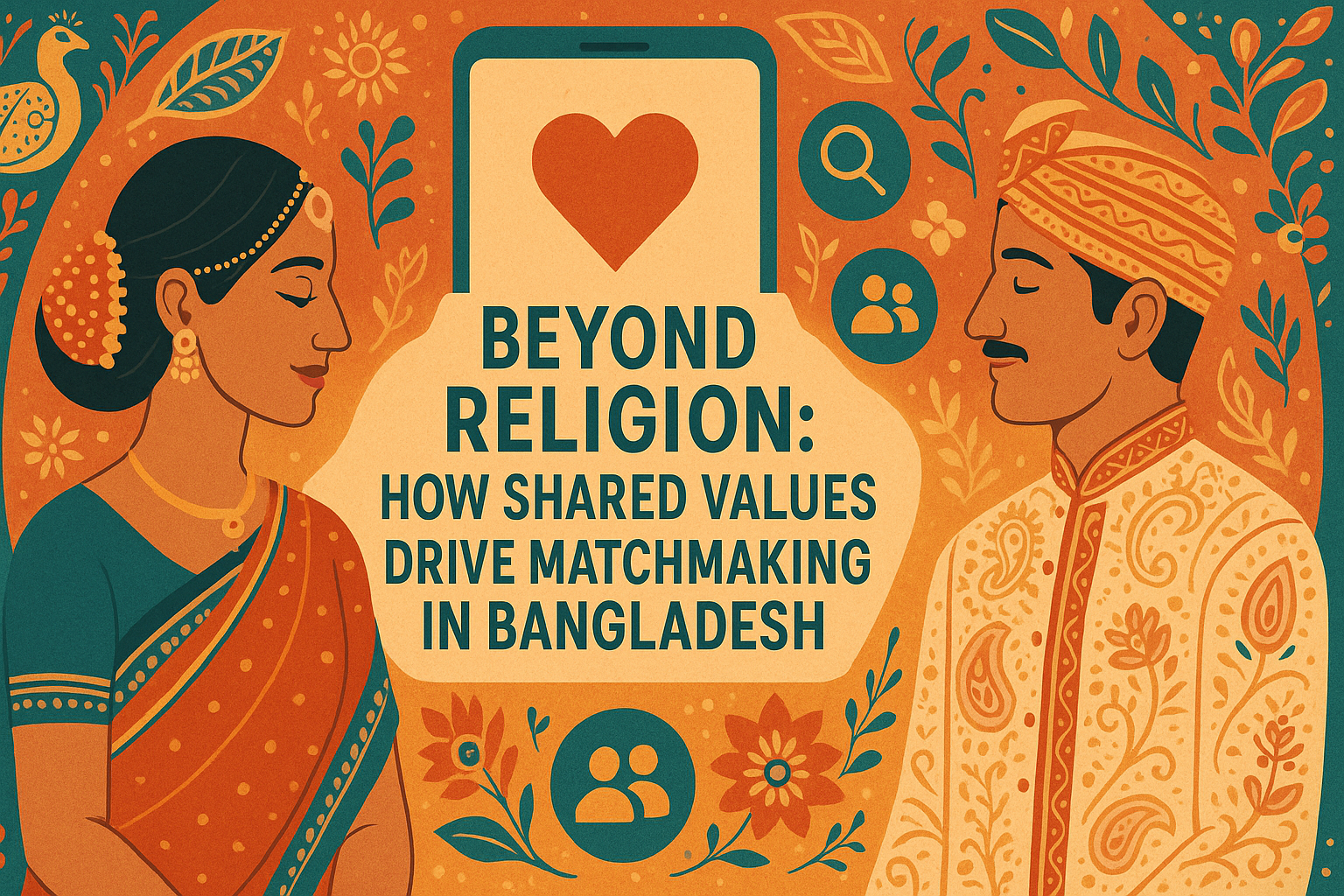
Beyond Religion: How Shared Values Drive Matchmaking in Bangladesh
Introduction
In Bangladesh, where every cup of cha has a backstory and
every cousin is a potential matchmaker, the art of matchmaking is undergoing a
cultural evolution. While religion remains a foundational pillar in many
matrimonial decisions, a refreshing shift is underway—shared values and
cultural compatibility are stealing the spotlight. Because let’s face it, you
can say “bismillah” before dinner, but if she’s into Rabindra Sangeet and
you’re more of a hip-hop-at-eid kind of guy… you’re not exactly soulmates in stereo.
The Traditional Landscape: Religion, Biodata, and Ghatoks
Historically, matchmaking in Bangladesh was a full-family
affair. Ghatoks (matchmakers) would show up with the infamous biodata—a
stat sheet more detailed than a World Cup scorecard—highlighting family
background, education, occupation, religious devotion, and even the complexion
of the bride and groom.
Back then, religion wasn’t just a checkbox. It was the box.
Everything else—habits, hobbies, dreams—were considered “negotiable,” as long
as the match checked off religious and social criteria. Cue in the arranged
marriage symphony: tea tray, shy glances, and a polite “we’ll let you know.”
The Shift: Education, Exposure & the Era of Shared Values
Fast forward to 2025, where WiFi is faster, weddings are
streamed live, and young Bangladeshis are, let’s just say, less shy.
Matchmaking is no longer just about shared faith—it’s about shared mindsets.
Today’s educated youth are prioritizing personal growth,
mutual respect, gender equality, and yes—Netflix preferences. A successful
match is less about matching sects and more about matching values: Does she
respect your career choices? Can he do the dishes without being asked (or
reminded twice)? Will your future mother-in-law learn your boundaries or just
bulldoze them?
Shared values like educational alignment, mutual respect,
emotional maturity, lifestyle compatibility, and even shared political
views are becoming deal-makers (or breakers).
Digital Matchmaking with Cultural Filters
Online matchmaking platforms in Bangladesh are now tailored
to the cultural nuances of the country. They allow users to screen potential
matches not just based on religion or profession, but on deeper preferences
like:
- Family
dynamics (nuclear vs. joint)
- Language
spoken at home
- Festive
traditions celebrated
- Gender
role expectations
- Future
goals and career priorities
Suddenly, matchmaking looks more like personal branding than
passive waiting. Brides and grooms are curating profiles with life
philosophies, and some even list their favorite Pitha or thoughts on in-laws
living next door. (Spoiler alert: many would rather not.)
Love in the Time of Logic: Why Cultural Compatibility Wins
It turns out, couples that bond over shared tastes in books,
respect for privacy, parenting styles, or even a mutual love for overpriced
coffee tend to build stronger emotional chemistry than those united solely by
religious identity.
In a society still deeply respectful of its religious roots,
this doesn’t mean faith is tossed aside. It means it’s no longer the only
glue. Couples are discovering that long-term happiness often rests in the quiet
details—like whether you both think biryani should have potatoes or not. (Yes,
this is a serious issue in some households.)
Real-Life Scenarios from the Deshi Diaries
Scenario A: Two Muslims, both engineers from Dhaka,
meet via a mutual friend. What seals the deal? Not prayer schedules, but their
shared dream of starting a robotics school for underprivileged kids.
Scenario B: A Hindu-Muslim couple registers their
marriage under the Special Marriage Act. Their bond? A fierce love for debate,
Shironamhin songs, and weekend hikes in Sylhet. Religion? Respected. Values?
Perfectly aligned.
Scenario C: She’s a painter who wants her own studio,
he’s a banker who supports her ambitions. His mother isn’t sure—but they stand
united. Her creativity inspires him. His stability comforts her. They both
agree that Eid should include cake. That’s progress.
Balancing Tradition with Modernity (Without Upsetting Grandma)
Let’s be honest: nobody wants to disappoint grandma. But
matchmaking today is about finding the sweet spot between tradition and today’s
truths.
A respectful nod to religious roots? Always. But alongside
that, a real evaluation of emotional readiness, respect for career choices,
openness in communication, and the ability to co-exist as equals.
This balance honors tradition without sacrificing
individuality. It’s about finding a partner who not only says “Inshallah” but
also listens when you say “Not tonight, I need space.”
Conclusion: Matchmaking, But Make It Meaningful
Religion may open the door, but it's shared values that keep
the lights on.
As Bangladesh continues to modernize, embracing diversity in
thought and lifestyle, the definition of a “perfect match” is expanding.
Cultural compatibility is no longer a luxury—it’s the backbone of sustainable,
joyful unions.
So whether your next match is arranged by your auntie or
discovered via a swipe-right moment, make sure you ask the real questions: Can
we grow together? Do we laugh at the same things? Will they eat shorshe ilish
with a smile—even when they secretly prefer beef curry?
Because in the end, love in Bangladesh isn’t just about
shared prayers—it’s about shared lives.